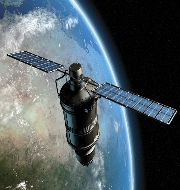Coolant Leak Raises Concerns About Russian Segment of the International Space Station
The Russian segment of the International Space Station (ISS) has experienced its third coolant leak in less than a year, raising concerns about the reliability of Russia’s space program. Fortunately, officials have assured that the crew members on board the ISS are not in immediate danger.
A Recurring Issue
The latest coolant leak is the third such incident to plague the Russian side of the ISS within a year. This pattern of recurring leaks has prompted questions about the underlying causes and the overall reliability of the Russian space program.
The Recent Coolant Leak
On a live feed of the ISS provided by NASA, viewers observed flakes of frozen coolant spraying into space. This phenomenon was also confirmed through radio communication between US mission control and astronauts on the station.
Russian Space Agency’s Statement
The Russian space agency, Roscosmos, acknowledged the coolant leak and stated that it originated from the external backup radiator circuit of the Nauka module, also known as the Multipurpose Laboratory Module-Upgrade (MLM). The module, which means “science” in Russian, was launched in 2021. Despite the leak, temperatures within the affected unit reportedly remained normal.
US Mission Control’s Response
US mission control in Houston instructed astronauts on the American side of the ISS to investigate the issue further. They were asked to check windows five or six in the cupola and confirm the presence of visual flakes. Astronaut Jasmin Moghbeli later confirmed the leak from the radiator on MLM.
Previous Incidents
The two previous coolant leaks on the Russian side of the ISS occurred in December 2022 and February of the same year. The December incident involved white particles resembling snowflakes streaming from a docked Soyuz MS-22 spacecraft. The cause of that incident was initially attributed to a possible micro-meteor strike.
Speculation and Concerns
The repetition of these coolant leaks has led to speculation about systemic issues within the Russian space program. Space analyst Jonathan McDowell expressed concerns, suggesting that three coolant leaks could indicate a more significant problem, possibly involving subcontractors. These incidents underscore the declining reliability of Russian space systems, especially when considered alongside other recent failures in their space program.
Challenges in the Russian Space Sector
Russia’s space sector has been grappling with a range of challenges, including funding shortages, mission failures, and corruption scandals. These difficulties have raised questions about the future of Russia’s space endeavors.
International Cooperation in Space
The ISS remains one of the few areas of ongoing cooperation between Russia and the United States despite geopolitical tensions resulting from Russia’s actions in Ukraine and international sanctions. The recurring coolant leaks serve as a reminder of the importance of maintaining international partnerships in space exploration.
Month: Current Affairs - October, 2023
Category: International / World Current Affairs • Science & Technology Current Affairs


